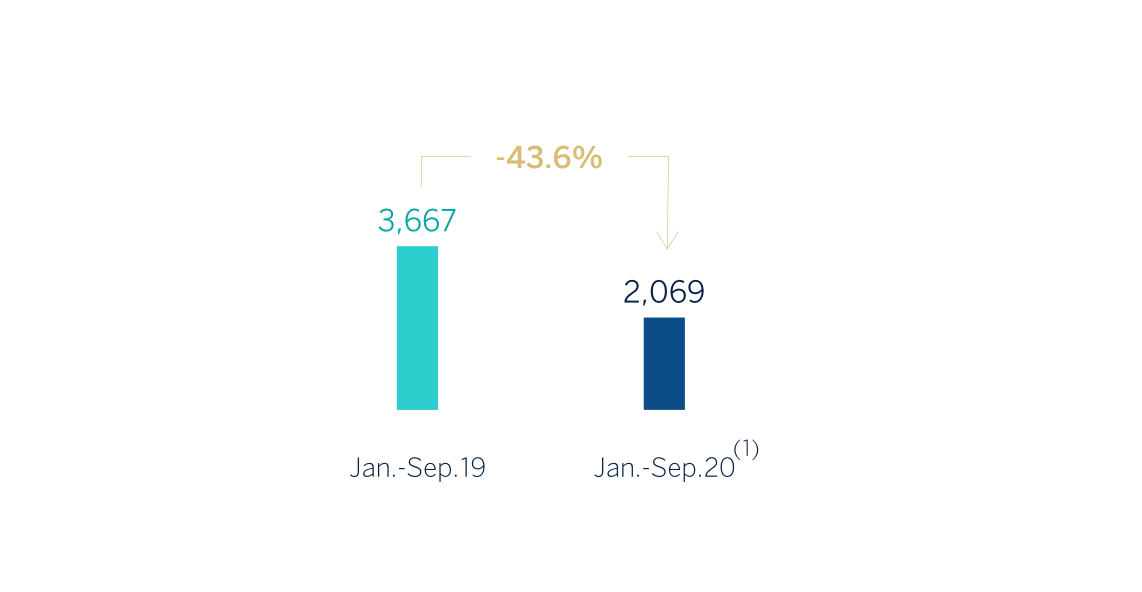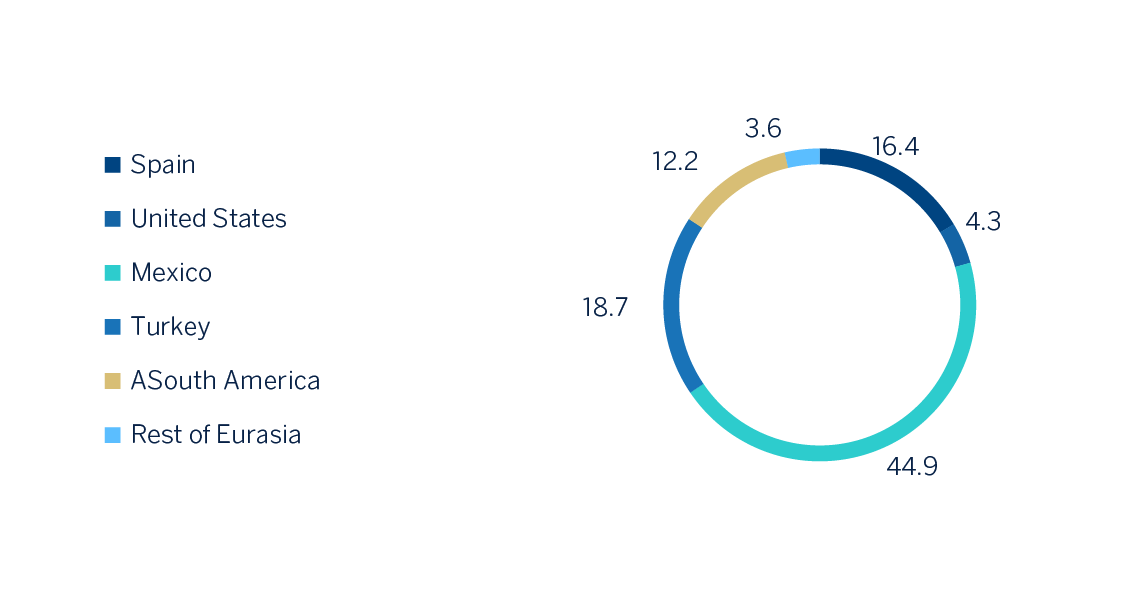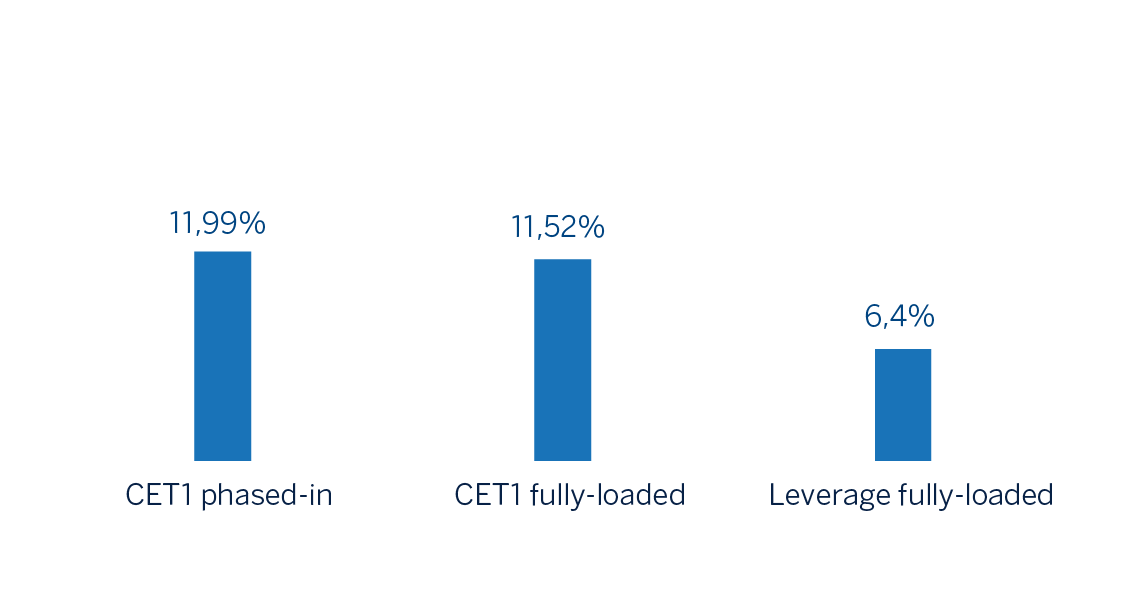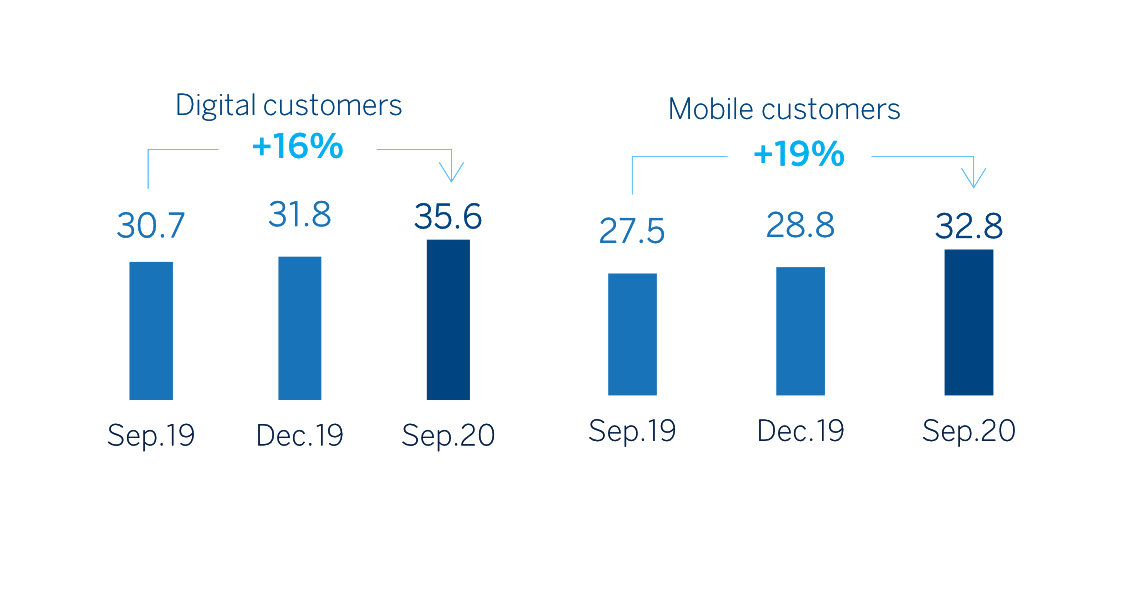Highlights
COVID-19 pandemic
- The appearance of the COVID-19 virus in China and its global expansion to a large number of countries, caused the viral outbreak to be classified as a global pandemic by the World Health Organization since March 11, 2020. The pandemic has affected and continues to adversely affect the world economy and the activity and economic conditions of the countries in which the Group operates, leading many of them into economic recession. The governments of the different countries in which the Group operates have adopted different measures that have conditioned the evolution of the first nine months of 2020, as explained below.
Results
- Year-on-year growth in operating income of 4.1% as of September 2020 (up 17.3% at constant exchange rates) driven by the net trading income (NTI) and a significant reduction in operating expenses, as a result of containment plans and the lower expenses derived from mobility restrictions in certain countries. As a result of the above, there was a significant improvement in the efficiency ratio.
- Impairment on financial assets increased due to the impacts of COVID-19.
- As a result of the valuation of the goodwill of its subsidiaries, the Group estimated that there was an impairment in the United States, which was recorded under the heading "Other results" of the consolidated income statement as of March 31, 2020. This impairment represented an impact of €-2,084m in the net attributable profit, mainly driven by the negative impact of the macroeconomic scenario update, affected by the COVID-19 pandemic. This impact does not affect the tangible net equity, capital, or liquidity of the BBVA Group.
- Finally, the cumulative net attributable loss as of the close of September 2020 was €-15m. If the goodwill impairment in the United States is excluded from the year-on-year comparison, the Group's net attributable profit, compared to the same period of 2019, fell by 43.6% with respect to the same period in 2019, to €2,069m. In the third quarter of the year, net attributable profit was €1,141m; 79.5% higher than that reached in the second quarter.
NET ATTRIBUTABLE PROFIT (MILLIONS OF EUROS)

(1) Excluding the goodwill impairment in the United States.
NET ATTRIBUTABLE PROFIT BREAKDOWN (1) (PERCENTAGE. JAN.-SEP. 2020)

(1) Excludes the Corporate Center.
Balance sheet and business activity
- The figure for loans and advances to customers (gross) fell by 4.0% compared to the end of the previous year, but with the corporate portfolio showing a slight growth.
- Customer funds grew by 0.6% in the first nine months of 2020, as a result of customers placing larger liquidity provisions with the Bank, which offset the lower balances recorded in off-balance sheet funds.
Liquidity
- The availability of substantial liquidity buffers in each of the geographical areas in which the BBVA Group operates and their management have allowed internal and regulatory ratios to be maintained well above the minimums required.
Solvency
- The BBVA Group has set the objective to maintain a buffer on its fully-loaded CET1 ratio requirement (currently at 8.59%) between 225 and 275 basis points. As of September 30, 2020, the CET1 fully-loaded ratio stood at 11.52%, above the target management buffer.
CAPITAL AND LEVERAGE RATIOS (Percentage as of 30-09-20)

Risk management
- The calculation of expected credit losses accumulated as of September 2020 incorporates:
- The update of the forward-looking information in the IFRS 9 models in order to reflect the circumstances created by the COVID-19 pandemic in the macroeconomic environment, which is characterized by a high degree of uncertainty regarding its intensity, duration and speed of recovery.
- The granting of relief measures in the form of temporary payment deferrals for customers affected by the pandemic, as well as the option to grant lending with a public guarantee facility.
NPL AND NPL COVERAGE RATIOS AND COST OF RISK (PERCENTAGE)

Purpose, values and strategy
BBVA's Purpose, to bring the age of opportunity to everyone, is more relevant than ever, as are our values: customer comes first, we think big and we are one team. This crisis has revealed the correct decision to opt for digitization, which has allowed the Bank to be closer to customers when they have needed it most, and reinforces our strategy. Therefore, our priorities remain unchanged; improve the financial health of customers, help them in the transition to a sustainable future, to grow in customers, seeking operational excellence and having the best and most committed team and the use of technology and data, will continue to be the pillars on which the Group's strategy is based.
Security, business continuity and support measures taken by BBVA
From the outset, BBVA has adopted a series of measures to support its main stakeholders. The main business continuity measures taken are:
- In order to serve customers, and since financial services are legally considered an essential service in most of the countries in which the Group operates, the branch network remained operational, with dynamic management of the network considering the evolution of the pandemic and activity. In addition, the use of digital channels and remote managers was encouraged. The data indicates that the COVID-19 crisis is accelerating digitization: At Group level, digital sales (measured in units) rebounded in March, and in April, reached 67.4%, with restrictions on the opening of branches in some of the countries where the Group operates, standing, in September 2020, at 63.6%, which very positively compares with the 59.9% in February. Also at the end of September, BBVA's digital customers accounted for 62% of the total and customers operating with the bank through their mobile phones accounted for 57% across the entire Group.
DIGITAL AND MOBILE CUSTOMERS (MILLIONS)

- With employees, recommendations from health authorities have been followed, including taking an early stance on promoting working from home. The priority in BBVA's return plan is to protect the health of our employees, customers and society in general. The return plan is being carried out following five principles: 1) cautiousness; 2) gradual return; 3) work shifts; 4) strict hygiene and safety measures; and 5) creation of early identification protocols. The crisis is being handled dynamically; adapting the procedures in each geographical area which the Group is present to the current situation, based on the latest data available regarding the evolution of the pandemic, the business and the level of customer service, in addition to the guidelines set by local authorities.
- In terms of cybersecurity, the increase in remote work and digital transactions as a result of the coronavirus crisis has led to an increase in the risk of cyber attacks. To ensure data and corporate information protection, BBVA has established the appropriate measures and continues to strengthen its prevention and monitoring efforts, thus mitigating the possible associated risks
The banks are a key part of the solution to the COVID-19 crisis. Among other support and responsibility measures, they include:
- BBVA has activated support initiatives with a focus on the most affected customers, regardless of whether they are companies, SMEs, self-employed workers or private individuals, and which includes, among others:
- In Spain, support for SMEs, self-employed workers and companies through credit lines and lines guaranteed by the Spanish Instituto de Crédito Oficial (ICO), extended until December 1, 2020, grace periods on loans to affected individuals (up to 12 months in residential mortgages for primary residence and up to 6 months in consumer lending), and moratorium of 3 months for citizens in social rental housing under the Social Housing Fund;
- In the United States, flexibility in the repayment of loans for small business and for consumer finance has been extended and certain fees and commissions for individual customers have been eliminated;
- In Mexico, grace periods up to 4 months on various credit products, fixed payment plans to reduce monthly credit card charges and suspension of Point of Sale (POS) fees to support retailers with lower turnover, as well as different support plans aimed at each situation for larger business customers;
- In Turkey, delay of loan repayments, interests and amortizations until December 31, 2020, without any penalty for private customers and extension of up to 6 months in the payment of principal on credits to companies;
- In South America, Argentina has provided micro-SMEs and SMEs with access to credit facilities to purchase teleworking equipment, funding facilities for payroll payments and refinancing unpaid credit card balances in 9 installments; Colombia has frozen the repayment of loans for individuals and companies for up to six months, and is offering a special working capital facility for companies; and in Peru, various measures were approved in order to support SMEs and customers with consumer loans or credit cards, including a payment term extension and an instalment reduction of up to 40%.
- To support society in this fight against the COVID-19 pandemic, BBVA donated €35m to purchase medical supplies, support vulnerable groups and promote research.
Pronouncements of regulatory bodies and supervisors
- With the aim of mitigating the impact of COVID-19, various European and international bodies have made pronouncements aimed at allowing greater flexibility in the implementation of the accounting and prudential frameworks. The BBVA Group has taken these pronouncements into consideration when preparing this report.
- On September 21, 2020, the European Banking Authority (EBA) communicated its intention not to extend the deadline to apply beneficial regulatory treatment to moratoriums, keeping September 30, 2020 as the deadline for the application of the guidelines on legislative and non-legislative moratoriums on loan repayments, applied in light of the COVID-19 crisis.
- With regard to the payment of dividends, on March 27th the European Central Bank (hereinafter ECB) recommended that, until at least October 1, 2020, credit institutions should refrain from distributing dividends or making irrevocable commitments to distribute them, and from repurchasing shares to remunerate shareholders. Consequently, the BBVA Board of Directors agreed to modify, for the 2020 financial year, the Group's shareholder remuneration policy, which was announced by means of a relevant event notification on February 1, 2017. The new policy for 2020 has been established as not making any dividend payments for the 2020 financial year until the uncertainties caused by the COVID-19 disappear and, in any case, not before the end of the financial year. This new policy complies with the extension of the ECB recommendation not to pay dividends before January 1, 2021
- In terms of solvency, the European Parliament and the European Council adopted Regulation 2020/873 (known as the "CRR Quick Fix"), which amends both Regulation (EU) 575/2013 (Capital Requirement Regulation (CRR)) and Regulation 2019/876 (Capital Requirement Regulation 2 (CRR2)), which will apply from June 27, 2020. Its main impacts on the BBVA Group as of September 30, 2020, involve the extension of the transitional treatment of IFRS 9 (only affects the phased-in ratios) and the bringing forward of the application of the SME and infrastructure support factor.
